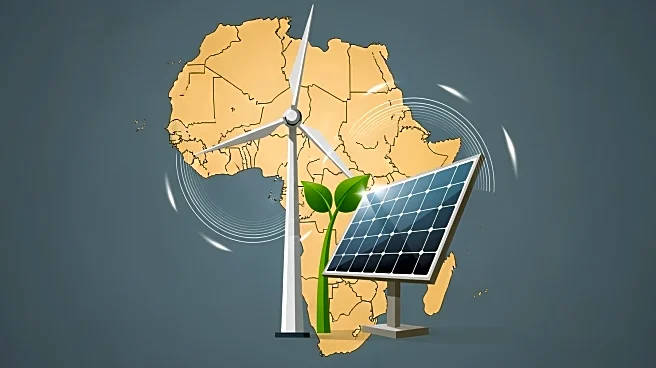What's Happening?
Voltalia, a renewable energy developer, has partnered with the International Finance Corporation (IFC) to implement renewable energy projects tailored for African mining operations. This collaboration
aims to transition mining activities from carbon-intensive energy sources to sustainable, low-carbon practices. The initiative, known as 'Power-to-Mine' projects, will utilize hybrid energy systems combining solar power, wind energy, battery storage, and advanced grid technologies. These systems are designed to meet the specific energy needs of mines across Africa, reducing reliance on diesel and coal, and aligning with international decarbonization standards. The partnership also offers a turnkey solution, managing all stages from project identification to maintenance, thus lowering entry barriers for mining operators unfamiliar with renewable energy systems.
Why It's Important?
The shift to renewable energy in African mining is significant due to the sector's reliance on carbon-intensive energy sources, which contribute to environmental pollution and make operations vulnerable to energy price fluctuations. By adopting renewable energy, mining companies can reduce operational emissions, enhance energy security, and meet global climate commitments. This transition is crucial for maintaining competitiveness and meeting the environmental, social, and governance (ESG) standards demanded by international stakeholders. The Voltalia-IFC partnership exemplifies how blended finance and multilateral cooperation can accelerate the energy transition, creating conditions for rapid investment and overcoming capital and risk barriers faced by individual mining companies.
What's Next?
The success of the Voltalia-IFC partnership could serve as a model for other regions facing similar energy and environmental challenges. As renewable energy adoption in Africa's mining sector gains momentum, governments and regulators will play a crucial role in facilitating this transition through supportive policies, tax incentives, and market mechanisms like emissions trading. The partnership's success could position Africa as a leader in sustainable mineral production, potentially increasing the value of African minerals in the global supply chain for green technologies. Additionally, the use of renewable energy in mining could provide electricity to nearby communities, reduce air pollution, and create technical training opportunities for the local workforce.
Beyond the Headlines
The transition to renewable energy in African mining has broader implications beyond immediate emissions reductions. It can enhance the social license to operate by improving relations with local communities through infrastructure upgrades and community involvement. The partnership also highlights the potential for Africa to host complex, large-scale green infrastructure projects, signaling confidence in the continent's ability to support sustainable development. However, challenges remain in financing, policy alignment, and technical integration, requiring creative solutions and cooperation among mining firms, regional utilities, governments, and civil society organizations.










